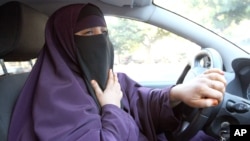In a decision with potentially wider implications, Europe’s highest court on Tuesday upheld France's controversial 2010 ban on full-face veils in public, dismissing a case brought by a French woman against the state for breach of religious freedom.
In its ruling, the European Court of Human Rights rejected a petition by a young Muslim woman that France's 2010 veil ban violated her rights and amounted to discrimination.
The Strasbourg-based court found the legislation did not violate the European Convention on Human Rights.
The French law bans most face-covering garments, including the Islamic face veil, or niqab, and Afghan-style burqa.
French authorities argue the measure is important not only for security reasons, but because face veils violate France's secularist creed and women's rights.
Only a small minority of French Muslim women actually wear face veils - the government estimates less than 2,000 of France's 5 or 6 million Muslims. Nonetheless, the ban has sparked controversy, with some Muslims arguing it unfairly singles them out.
Reactions
Reacting to the ruling, French Council of the Muslim Faith head Dalil Boubakeur said face veils like the niqab are not a religious obligation.
Boubakeur said the word niqab is not mentioned in the Koran as a religious prescription. He said he has no problem with banning the garment, although he said stricter Muslims may disagree.
But Amnesty International called the court's ruling "deeply damaging" and a "profound retreat on the right of freedom of expression and religion."
A researcher on radical Islam at the Paris-based National Center for Scientific Research, Maryam Borghee, said she is concerned about the ruling's ramifications.
In 2012, Borghee authored a book about why young French women adopt the veil, which she said many do voluntarily.
Borghee said she believes the ruling will deepen the divide between more conservative European Muslims, even if they are in the minority, and public powers. And it will reinforce the belief among Muslims that they are being stigmatized because of their religion.
The European court's ruling may have wider implications.
Belgium also adopted the veil ban, as have some areas of Switzerland.
In France, the ruling reinforces a number of judicial decisions in favor of the ban, including one just a few days ago by the country's highest court (Court of Cassation).
No discrimination
Two of the 17 judges, who spent several months deliberating on the case, dissented from the majority view. But the judges agreed unanimously that the woman had not been a victim of discrimination.
Authorities passed the law under former President Nicolas Sarkozy's administration, casting the full-faced veil as an affront to the country's tenets of secularism as well as being degrading to women. It is also a security risk, preventing the accurate identification of individuals, officials have said.
The 24-year-old French woman who brought the lawsuit had not been prosecuted under the law, which has resulted in only a few arrests since it was introduced in 2010, according to the French news agency AFP.
The woman, a university graduate, had requested anonymity for fear of reprisals in France over her action.
She had argued that being obliged to take off her veil in public was degrading.
In written evidence, she had testified that she wore the full veil of her own free will and was willing to remove it whenever required for security reasons - addressing two of the main arguments put forward by French authorities in support of the ban.
Some information for this report provided by Reuters and AFP.




